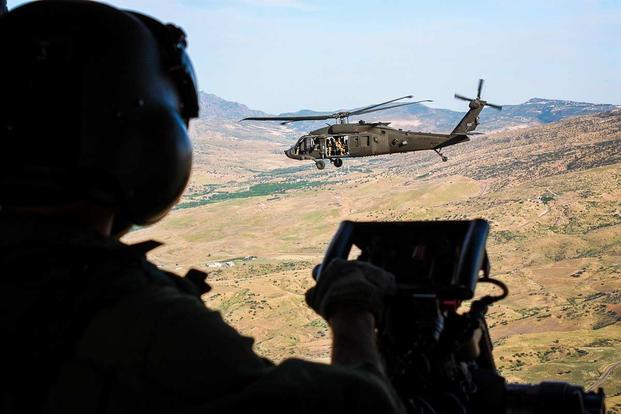Coalition aircraft can still come to the rescue of ground troops even as Iraq recently enacted airspace limitations, according to the task force overseeing the U.S.-led air campaign against the Islamic State.
"Under emergency circumstances, the Government of Iraq does not require individual permission for each incident," officials with Combined Joint Task Force-Operation Inherent Resolve said in an email to Military.com on Tuesday. "CJTF-OIR is authorized by the Government of Iraq to provide emergency support to any Coalition Forces and Iraqi Security Forces in danger."
Task & Purpose reported Monday that pilots flying in and out of the country would need permission before transiting through Iraqi airspace in light of a recent restriction ordered by Prime Minister Adel Abdul-Mahdi.
But that restriction does not apply to close-air support or casualty evacuation, U.S. Army Col. James Rawlinson, spokesman for the anti-Islamic State campaign, later clarified to the news outlet. There are roughly 5,200 U.S. troops operating in Iraq.
Related content:
- US-Led Military Force Fighting ISIS Agrees to Halt All Flights over Iraq
- F-15Es, A-10s Leading Air War Against ISIS
- Air Force Tests How Quickly, Nimbly It Can Deploy F-35 in 'Agile Lightning'
- US Airstrikes Hit Decade-Long High Amid Peace Efforts in Afghanistan
Asking for permission is already part of protocol, according to a top U.S. Air Force general.
"I think that's something you've always done when you're operating in another nation," Gen. Mike Holmes, head of Air Combat Command, said Tuesday when asked about the new regulation at a Defense Writers Group breakfast in Washington, D.C . "You've always had to make sure you fit into their command and control."
"Iraq's capabilities to monitor and maintain and direct their own airspace are improving, which is good," Holmes said. "They're going to exert some control over that and take responsibility for the defense of Iraq, which is overall a good news story. I think we still have a partnership. I think our guys still work closely together there, and we'll work through those details."
Last week, Abdul-Mahdi called for curtailed air operations after an unexplained blast at Camp Al-Saqr, or Camp Falcon, just outside Baghdad killed a civilian and injured more than a dozen others.
Any unauthorized flights were banned outright, according to The Washington Post. While the explosion's cause remains unknown, Middle East officials have theorized that either extreme heat in the region caused the base's weapons depot to explode or that Israel carried out a strike against Iranian-backed militias operating in the area, according to the Post.
The news comes as targeted strikes on ISIS militants in Iraq and Syria have waned.
U.S. military aircraft dropped 105 total munitions on ISIS targets last month, according to recent statistics published by Air Forces Central Command.
That number was less than half the 241 munitions dropped in July 2018.
In July 2017, 4,313 munitions were dropped, according to the data. That year, the most bombs on record -- 39,577 -- were used against the group.
-- Oriana Pawlyk can be reached at oriana.pawlyk@military.com. Follow her on Twitter at @Oriana0214.













